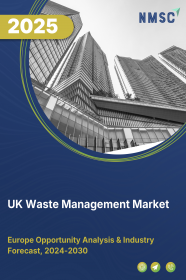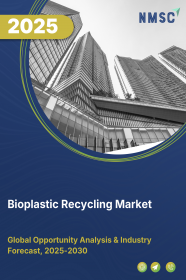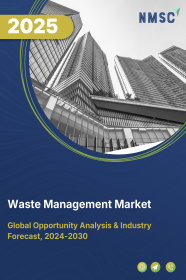
The UK Waste Management Market by Waste Type (Municipal Solid Waste (MSW) or Household, Industrial, and Commercial) and by Waste Treatment (Composting, Incineration, Controlled Landfill, Uncontrolled Landfill, Sanitary Landfill, Open Dump, and Recycling)– Opportunity Analysis and Industry Forecast, 2024 – 2030
Industry: Energy & Power | Publish Date: 16-May-2025 | No of Pages: 24 | No. of Tables: 82 | No. of Figures: 47 | Format: PDF | Report Code : EP1245
US Tariff Impact on UK Waste Management Market
Trump Tariffs Are Reshaping Global Business
The UK Waste Management Market Overview
The UK Waste Management Market size was valued at USD 8.32 billion in 2023, and is predicted to reach USD 12.50 billion by 2030, at a CAGR of 4.90% from 2024 to 2030.
The UK waste management market involves a wide range of services and activities aimed at managing and mitigating the impact of waste generated by various sectors including residential, commercial, industrial, and healthcare. It includes the collection, transportation, processing, recycling, and disposal of waste materials in a manner that is environmentally responsible and sustainable. The market also involves the development and implementation of technologies and practices that promote waste reduction, resource recovery, and the safe handling of hazardous materials.
Key components of the waste reduction market include waste collection services, recycling facilities, waste-to-energy plants, landfill operations, and environmental consulting services. As awareness of environmental issues grows, the waste reduction market continues to expand, driven by growing population, technological advancements, and increasing public demand for sustainable waste solutions.
Rising Waste Generation Amid Population Growth Fuels UK Waste Management Market
The steady increase in the UK population and associated urbanization trends are contributing significantly to the expansion of the country's waste management market. According to the World Bank, the UK's population grew by approximately 0.8% in 2023, following a slight decline of -0.08% in 2021. This resurgence in population growth has intensified residential and commercial waste generation.
Recent government data indicates that UK biodegradable municipal waste sent to landfill decreased to 6.3 million tonnes in 2022 from 6.7 million tonnes in 2021. England is responsible for 81% of UK biodegradable municipal waste to landfill, generating 5.1 million tonnes of the 6.3 million tonnes UK total in 2022. Despite this reduction, the volume remains significant, highlighting ongoing pressures on waste management infrastructure.
This escalating volume of waste underscores the urgent need for investment in advanced waste management technologies and infrastructure. The demand for efficient collection, recycling, and landfill diversion solutions is driving innovation across the sector. Consequently, stakeholders are accelerating the deployment of smart waste systems and sustainable practices to meet regulatory requirements and environmental goals, thereby fueling growth in the UK waste management market.
Rising Waste Volumes and Stagnant Recycling Rates Drive Demand for Advanced Waste Management Solutions in the UK
The United Kingdom is experiencing increasing pressure on its waste management infrastructure due to rising waste volumes and plateauing recycling rates. In the 2022/2023 financial year, England's household recycling rate declined to 43.3%, down from 45.5% in 2019/2020, marking a 2.2 percentage point decrease over three years.
Regionally, Wales continues to lead with a household recycling rate of 56.9% in 2022, attributed to consistent policies like separate food waste collection. Northern Ireland achieved 49.2%, Scotland 42.1%, and England 43.4%.
Packaging waste remains a significant challenge. In 2023, the UK generated approximately 12.7 million tons of packaging waste, with a recycling rate of 64.8%. Material-specific recycling rates varied: paper and cardboard at 73.4%, metal at 71.2%, glass at 67.8%, and plastic lagging at 52.5%.
These figures highlight the urgent need for investment in advanced waste management technologies and infrastructure. To address these challenges, the UK government has set ambitious targets under the Resources and Waste Strategy, aiming for a 70% overall recycling rate for all packaging types by 2030. Achieving these targets will require the adoption of innovative recycling processes, infrastructure upgrades, and public awareness campaigns to promote sustainable waste management practices.
Regulatory Complexity and Rising Compliance Costs
The U.K. is undertaking Extended Producer Responsibility (EPR) reform for packaging, simpler recycling, and a forthcoming Deposit Return Scheme that imposes new collection, reporting, and funding obligations on both businesses and councils. These changes will ultimately drive higher recycling rates. However, in the near term, they are creating significant cost burdens. Producers must purchase Packaging Recycling Notes (PRNs), and local authorities face new container and collection requirements, without guaranteed funding to cover the extra bins and vehicles.
The 2024 Separation of Waste (England) Regulations obliges councils and businesses to collect six separate waste streams (glass, metal, plastic, paper/card, food, and garden waste) or demonstrate that it is not “technically or economically practicable.” Because many authorities cannot simply reduce refuse collections in step, introducing additional recycling bins often means higher overall waste‑service costs until bin rationalisation savings can be realised.
Waste to Energy in the UK ETS Expansion
Energy-from-Waste (EfW) facilities will be included under the “full surrender” phase of the UK Emissions Trading Scheme (UK ETS) from 2028. This will require operators to account for their carbon emissions, but it will also open opportunities to trade emissions allowances based on the generation of low-carbon electricity and heat.
Proactive waste management companies can capitalize on this shift by investing in carbon-capture-ready EfW infrastructure, positioning themselves to benefit from both emissions reductions and carbon credit trading—either through the UK ETS or voluntary carbon markets. This evolving landscape could enable innovative financing models, including public-private partnerships, to support sustainable waste-to-energy developments.
Competitive Landscape
The promising key players operating in the UK waste management industry includes Biffa Limited, Renewi Plc, Viridor Limited, FCC Environment, Mick George, DS Smith, Reconomy, Veolia UK Limited, SUEZ Recycling and Recovery UK Ltd, REMONDIS UK Ltd., and others.
The UK Waste Management Market Key Segments
By Waste Type
-
Municipal Solid Waste (MSW) or Household
-
Food
-
Paper and Cardboard
-
Plastic
-
Glass
-
Metal
-
Others
-
-
Industrial
-
Manufacturing Waste
-
Construction & Demolition Waste
-
Agriculture Waste
-
Other Industrial waste
-
-
Commercial
By Waste Treatment
-
Composting
-
Incineration
-
Controlled Landfill
-
Uncontrolled Landfill
-
Sanitary Landfill
-
Open Dump
-
Recycling
Key Players
-
Biffa Limited
-
Renewi Plc
-
Viridor Limited
-
FCC Environment
-
Mick George
-
DS Smith
-
Reconomy
-
Veolia UK Limited
-
SUEZ Recycling and Recovery UK Ltd
-
REMONDIS UK Ltd.
REPORT SCOPE AND SEGMENTATION:
|
Parameters |
Details |
|
Market Size Value in 2023 |
USD 8.32 billion |
|
Revenue Forecast in 2030 |
USD 12.50 billion |
|
Value Growth Rate |
CAGR of 4.90% from 2024 to 2030 |
|
Analysis Period |
2023–2030 |
|
Base Year Considered |
2023 |
|
Forecast Period |
2024–2030 |
|
Market Size Estimation |
Billion (USD) |
|
Growth Factors |
|
|
Companies Profiled |
10 |
|
Customization Scope |
Free customization (equivalent up to 80 working hours of analysts) after purchase. Addition or alteration to country, regional, and segment scope. |
|
Pricing and Purchase Options |
Avail customized purchase options to meet your exact research needs. |

















 Speak to Our Analyst
Speak to Our Analyst



















